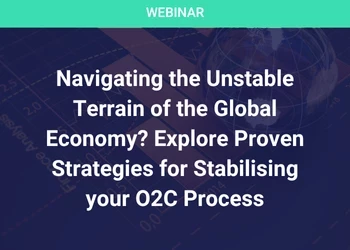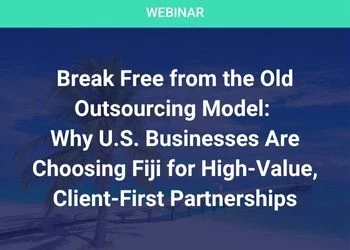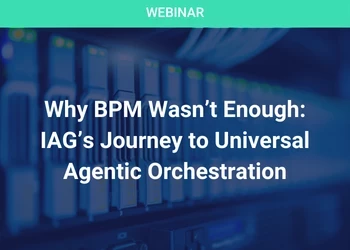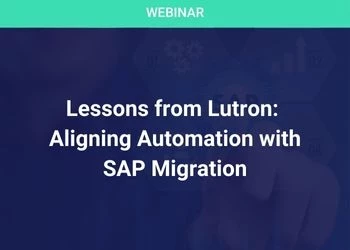Outsourcing Statutory Accounts, Tax & VAT Compliance to an External Partner
Add bookmarkTwo years ago the European arm of CA, Inc (formerly Computer Associates) embarked on a large-scale finance transformation program aimed at bringing together over two dozen disparate local accounting organizations before implementing a single ERP system. The transformation - which involved the creation of three shared service centers, in France, Germany and the UK respectively - was intended to improve controls as well as streamlining processes ahead of an SAP implementation scheduled for August this year; cost-reduction, of course, was another driver.
"When I joined we had a very decentralized finance organization with finance teams in 26 countries in Europe, each country with around two or three legal entities on average," explains Clemente Cohen, CA’s SVP Finance EMEA. "From a control perspective this is difficult to manage and oversee, so the potential for mistakes is very high, on the volume side and on the technical accounting side. And then obviously cost efficiency: having in each country finance departments with their own systems, and keeping the technical knowledge in each country, is very costly. In countries with small teams you don’t have the backup and that’s very risky."
One of the major elements of the program was compliance. With operations in so many countries across the region, it was crucial for CA to maintain a rigorous and robust compliance structure - but at the same time, retaining all that local knowledge can prove extremely costly, and doesn’t fit in easily with the kind of move towards optimal streamlining and efficiency that Cohen and his team had in mind. The decision was taken to outsource statutory accounts, tax and VAT compliance to an external partner.
"I had the clear vision that volume accounting needed to be centralized, to be more efficient and to have backups … For small countries you can’t afford to have all the knowledge in place so you need a partner who can help you cover those areas. For me one prerequisite of having a shared service center is to cover the requirements of local GAAP knowledge and local legislation obligations. It’s my personal opinion that you can’t move to a shared service center if you don’t cover this area. If you don’t have a partner who has the local knowledge for you - how to prepare a VAT declaration, how to calculate tax, how to cross-check your declarations - then you will fail. Then you will have compliance issues. Luckily I have had experience with similar projects before" - in a previous role, Clemente set up shared service centers in Europe, Asia-Pacific and Latin America for another US IT company - "so I was aware of the issues that might arise with compliance - and I wanted to avoid them!"
Following a period of deep research into the capabilities of various possible providers, CA opted for a partnership with BDO Stoy Hayward, the UK arm of BDO International, the world’s fifth-largest accountancy firm. This partner would take over the responsibility for local legislative and fiscal compliance in each of CA’s European countries of operation, with BDO staff on the ground taking on work which was previously done in-house at significant cost. Cohen confirms that his organization did at one time consider choosing a Big Four firm as a provider - but in this case he felt the advantages of working with BDO outweighed the benefits of looking elsewhere.
"First of all there aren’t too many firms that can cover all the European countries. You need to go to one of the larger service providers. So we looked at those - and automatically the firm that’s doing the audit for you, you can’t ask to do the work, so you lose one option. So we were left with three or for choices, and BDO - through the conversations, and then negotiations, that we had - we thought saw us as a business partner, not as just a client. We felt we would have a strong partnership to start the business together.
"[During initial talks] BDO gave us lots of references and most of the feedback that we received was that BDO was seen as a flexible partner trying to react to the needs of the client. When you deal with some of the very large providers that just can’t be the case; they’re so large that you just need to follow their processes. We needed a partner that would help us develop processes together. I had the impression that this relationship was seen as a good challenge by BDO and by ourselves as well, and that gave me the confidence that we’d found the right partner."
BDO came into the picture at a very early stage of the program - "I don’t think they could have got involved any earlier," Clemente says with a wry smile - which was, according to BDO Stoy Hayward’s David Lewis, Director Business Advisory & Outsourcing, a great advantage for a number of reasons.
"We put a great emphasis on the transition," says Lewis. "There ’s a three-month period where we really got to know each other; we brought all of our people from around Europe to a workshop here (at CA HQ) so everybody knew what was expected of them - and it’s also very important to build personal relationships with the opposite number. We know there are going to be issues along the way, teething troubles - it’s important to build up a level of trust to work through those. At the end of the day you have to deliver on time, and you need to do whatever you need to do to make sure that happens."
It was also vital, Lewis believes, that his company was able to join with CA at a time when it was still possible to work together defining processes at the same time as drawing up how exactly the relationship was to operate.
"It’s always good to be involved as early as possible because then you can shape the process to a greater degree," he confirms. "We had a three-month transition, then during the first six to nine months of working together we had to constantly improve our relationship and the way we work. This project was different from some of those that we’ve worked on because the move to the regional shared service centers was happening at the same time that we were taking over the compliance. In other situations the SSCs are already in place, and we’re just coming in and taking over the compliance, so it’s much more straightforward. When you’re moving to the SSCs at the same time there is more uncertainty and flexibility becomes extremely important!"
Once confirmed, the relationship between CA and its new partner developed rapidly and on several fronts.
"On a European level I had a project management team working closely with David and other BDO members: it wasn’t just me!" laughs Cohen. "Then once we agreed that we would be working together, and the contract was pretty final, we started to go out to the countries - as David will explain, we had a European kick-off meeting, and regional kick-off meetings as well, and then we made sure that in each country the country controllers, the country finance lead, and the BDO leads were meeting together. Now we’re talking here about an organization of 25-plus countries. You will experience all sorts of potential: good things and bad things! Some countries right from the start were able to develop a great relationship, find ways to work together. In other countries is took a little longer: in some cases because CA took a little longer to adapt, in other cases because maybe BDO took a bit longer. But the key is that the agreement we had on a European level was so strong that we always worked together to resolve these. And what’s happening today is that we don’t hear any complaints – from either organization - that the other partner is not helping."
The relationship has matured, and processes optimized, to the extent that now Cohen’s own involvement is significantly reduced.
"It’s so steady that I don’t really have to be involved! On my direct-report level meetings were weekly, almost daily; today, though, we’re really moving to quarterly review."
"There are different levels of engagement," Lewis explains. "At the project management level meetings are more regular; at Clemente’s level we meet once a quarter - initially maybe monthly - and now the meetings are less regular. But then of course things change - although as I say we are now in a steady state, there are always new things happening - so we have to meet operationally to take on board new instructions"
Cohen concurs: "It’s an ongoing process. You change the requirements for tax: so there’s got to be another discussion between the tax organization and BDO, to agree the SLAs, to discuss what the time and effort is going to be. If there is a change in the fees to be discussed, obviously then it has to come to me and we’ll discuss that. Now all these things happen very smoothly; in the beginning of course it was all about getting these processes defined."
How long did that definition take?
"A year, a year. But it’s not surprising that it took us a year," Cohen smiles. "The challenge was that when we started working together we were working on a vision, towards a goal. We wanted to have the RSCs in place, the SSCs, and we knew we’d need the help of BDO, and in which areas - but it was difficult to define all the details, because we didn’t have the SSCs in place! So over time the requirements are changing - and of course CA is changing: your strategy changes, your people change. You have the umbrella contract but you have to adapt to the changes that will always occur."
The decision to create service centers in France (Paris), Germany (near Frankfurt) and the UK (Slough, outside London), which had such an impact on the development of the relationship (and indeed was a significant factor in the choice of BDO in the first place) was taken for a number of reasons, Clemente says.
"Because we have numerous instances of the accounting systems that we’re using today, a lot of the processes were home-grown. It’s my opinion that you can’t go to a low-cost country where you don’t have the experience and history of the company, and ask the people to take local processes and local chartered accounts. You have to standardize your processes, standardize your systems, your ERP, and then you can start thinking about the next step. For me it was key to keep the legacy knowledge within the company. And those are our three biggest markets, our three biggest organizations so because of this we already have the people and premises in place. Yes, you invest in an area where the costs are higher per employee, but you don’t have to invest in new infrastructure - nor relocate the employees who can retain your legacy knowledge.
"The large organizations normally have processing centers in low-cost places," he continues. "This is good - for them - but from a price perspective there’s no difference. And such a centralized organization will dictate the process. For me it was key to have a single point of contact; my team goes to David, and he communicates things to his team across Europe. Whether my partners are on our premises or are working in their own offices I don’t care, as long as the relationship is good."
With processes now mature and the relationship continuing to blossom, how happy is Clemente that his organization has satisfied the drivers of increased control and cost-efficiency that they initially set out to achieve?
"I ’m very happy in different ways," he says. "The first way - and this was always our vision - we need SSCs to be able to implement an ERP system for Europe. And know we’re in the process of doing this, and we can focus on three centers rather than 30 countries which would have been impossibly expensive. And I’m happy because we now have visibility over our compliance situation. We know in which countries we are filing, have filed, haven’t filed our accounts, and why; we know where we stand on VAT; we know where we stand on corporate tax. This is really helping a lot. Where I’m extremely pleased is with the flexibility of BDO. When our requirements are changing they react very fast. When we want to change processes across the continent for year-end we have a partner who can do this. And as for cost: even going to the most expensive places I achieved my cost goals! In some countries in the past keeping local GAAP knowledge was very expensive, especially replacing people. So we are achieving savings."
As with any relationship on such a scale, the partnership hasn’t been without its teething troubles. However both Cohen and Lewis are proud that their teams have worked successfully to get over any and all obstacles that have been put in their way.
"We certainly haven’t done a perfect job. On the tax side I would spend more time internally, to agree with the corporation what is required. I’d really sit down to document our strategy to work out what we really need from a service provider. On the VAT side, I’d try to define better the roles of each of the functions. But we knew that it wouldn’t be perfect; we created a trial. We weren’t sure that we were ready, but we said ‘hey, let’s try it!’ And we were able to give things a go and work on the processes as we went."





















